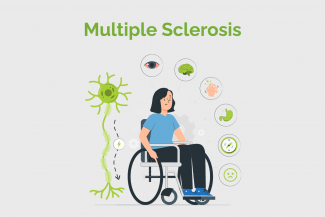
The clinical signs and symptoms of MS depend on the site of the loss of myelin in the central nervous system. The lesions may occur almost anywhere in the central nervous system, but they have a predilection for certain areas.
More than 60% of individuals with MS have visual problems caused by demyelinating lesions (loss of myelin) of the optic nerve, which is the nerve concerned with vision. The loss of vision usually occurs over a period of several days, with partial recovery within 1 month. Other eye symptoms include nystagmus (involuntary movement of the eyes or dancing eyes), colour blindness and diplopia (double vision) caused by involvement of the third, fourth, and sixth cranial nerves which supply to the eye muscles.
Loss of sensation or changes in sensation such as tingling, pins and needles or numbness, muscle weakness, very pronounced reflexes, muscle spasms of the extremities; difficulties with coordination and balance (ataxia), problems with speech or swallowing can also be seen.
Difficulties in thinking and emotional problems such as depression or unstable moods are also common.
Other signs of the disease include urinary bladder dysfunction, vertigo and generalised in coordination (lack of coordination).
Uhthoff’s phenomenon found in MS is characterized by worsening of any of the above symptoms following a body temperature increase that occurs as a result of strenuous exercise, taking hot baths or staying outside for long time on sunny days.














